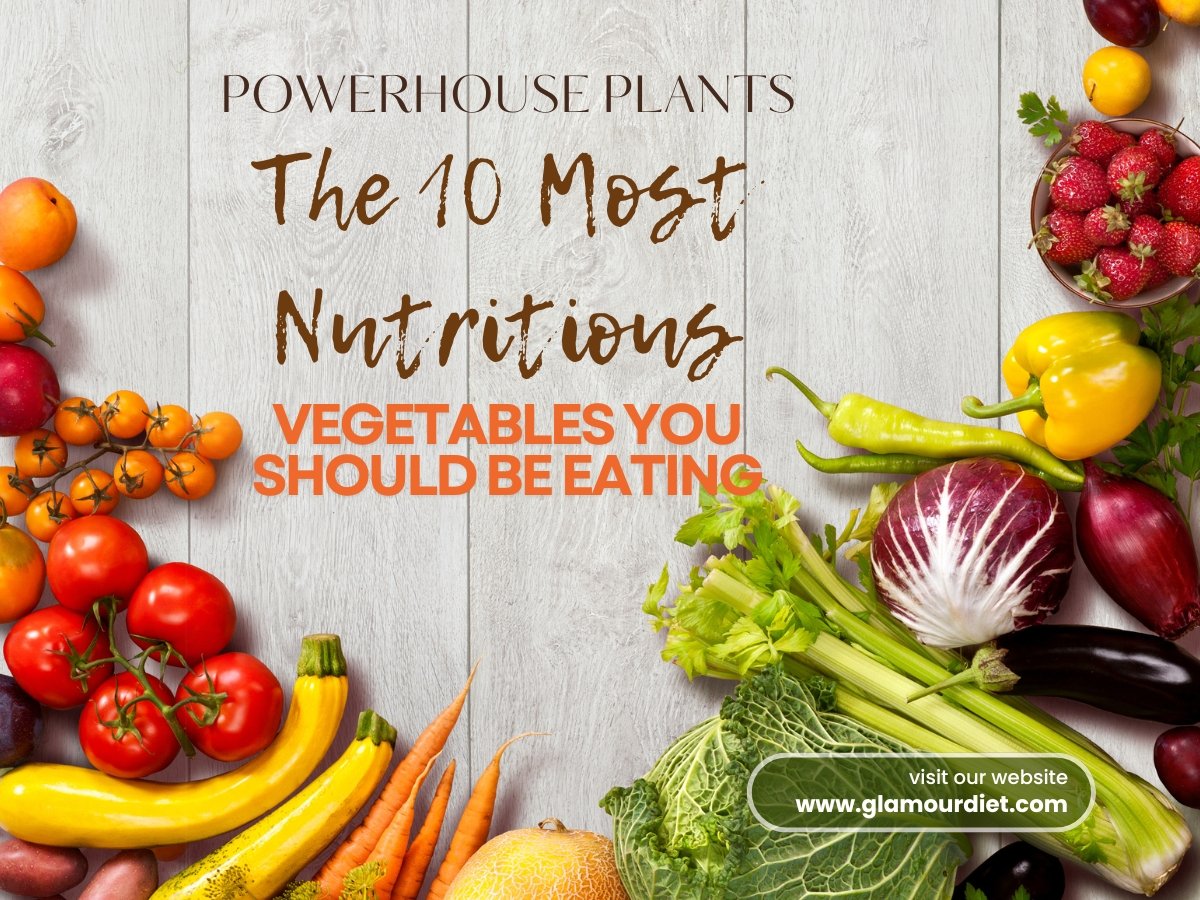When it comes to maintaining a healthy diet, vegetables play an essential role. They are packed with vital nutrients, vitamins, and minerals that our bodies need to function at their best. But not all vegetables are created equal—some stand out as nutritional powerhouses that provide extraordinary health benefits. In this article, we’ll explore the top 10 most nutritious vegetables you should be eating and how they can enhance your overall well-being.
The 10 Most Nutritious Vegetables
Spinach
Nutritional Profile:
Spinach is a leafy green vegetable that’s incredibly nutrient-dense. It’s rich in vitamins A, C, and K1, folate, iron, and calcium. One cup of raw spinach provides 56% of your daily vitamin A needs and your entire daily requirement of vitamin K.
Health Benefits:
Spinach is known for its high antioxidant content, which helps fight oxidative stress and inflammation in the body. It also supports eye health due to its high levels of lutein and zeaxanthin, two antioxidants that are important for eye function. Additionally, spinach is excellent for bone health and can aid in regulating blood pressure.
How to Incorporate:
Spinach is versatile and can be added to smoothies, salads, and soups, or sautéed as a side dish.
Kale
Nutritional Profile:
Kale is another leafy green that’s loaded with nutrients. It’s particularly high in vitamins A, K, C, and B6, as well as manganese, calcium, copper, potassium, and magnesium.
Health Benefits:
Kale is renowned for its potential cancer-fighting properties, thanks to compounds like sulforaphane and indole-3-carbinol. It’s also excellent for heart health, aiding in the reduction of cholesterol levels, and supporting healthy skin due to its high vitamin C content.
How to Incorporate:
Kale can be enjoyed in salads, smoothies, or as a crispy snack when baked into chips. It also pairs well with soups and stews.
Broccoli
Nutritional Profile:
Broccoli is a cruciferous vegetable rich in vitamins C and K, folate, potassium, and fiber. It also has a good amount of protein for a vegetable.
Health Benefits:
Broccoli contains powerful antioxidants, including sulforaphane, which may help protect against various types of cancer. It’s also beneficial for bone health due to its high vitamin K content and supports immune function thanks to its vitamin C.
How to Incorporate:
Broccoli can be steamed, roasted, or stir-fried, and it makes a great addition to casseroles and pasta dishes.
Carrots
Nutritional Profile:
Carrots are best known for their high vitamin A content, which comes from beta-carotene. They also provide vitamin K, potassium, and fiber.
Health Benefits:
Carrots are essential for maintaining healthy vision, particularly night vision, due to their high beta-carotene content. They also have antioxidant properties that help protect the body from chronic diseases.
How to Incorporate:
Carrots are perfect for snacking raw, adding to salads, or cooking into a sweet and savory glaze.
Sweet Potatoes
Nutritional Profile:
Sweet potatoes are rich in beta-carotene, vitamins C and B6, potassium, and fiber. They are also a good source of manganese.
Health Benefits:
The high beta-carotene content in sweet potatoes supports eye health and boosts the immune system. Their fiber content helps in digestion and maintaining gut health, and the potassium aids in regulating blood pressure.
How to Incorporate:
Sweet potatoes can be baked, roasted, mashed, or added to soups and stews.
Garlic
Nutritional Profile:
Garlic is known for its high content of vitamins C and B6, manganese, and selenium. It also contains sulfur compounds, which have potent biological effects.
Health Benefits:
Garlic is widely recognized for its ability to boost the immune system. It can help lower blood pressure, reduce cholesterol levels, and may even have cancer-preventing properties due to its rich antioxidant content.
How to Incorporate:
Garlic is a flavorful addition to almost any savory dish. Use it in marinades, dressings, and sauces, or roast it whole for a milder, sweeter flavor.
Beets
Nutritional Profile:
Beets are rich in fiber, folate, manganese, potassium, iron, and vitamin C. They are also high in nitrates, which convert to nitric oxide in the body.
Health Benefits:
Beets are excellent for improving blood flow and lowering blood pressure due to their nitrate content. They also support brain health and help reduce inflammation.
How to Incorporate:
Beets can be eaten raw, roasted, or added to salads and smoothies. They also make a great addition to juices.
Bell Peppers
Nutritional Profile:
Bell peppers are loaded with vitamins A and C, potassium, folic acid, and fiber. They are available in various colors, each with slightly different nutrient profiles.
Health Benefits:
Bell peppers are particularly beneficial for eye health due to their high vitamin A content. They also help boost the immune system and reduce the risk of chronic diseases with their antioxidant properties.
How to Incorporate:
Bell peppers can be eaten raw, stuffed, roasted, or added to stir-fries, salads, and salsas.
Brussels Sprouts
Nutritional Profile:
Brussels sprouts are rich in vitamins K and C, folate, manganese, and fiber. They belong to the cruciferous vegetable family.
Health Benefits:
Brussels sprouts support bone health, thanks to their high vitamin K content. They also aid in digestion and have anti-inflammatory properties that can help protect against chronic diseases.
How to Incorporate:
Roast Brussels sprouts with olive oil and spices, or add them to a hearty winter stew.
Tomatoes
Nutritional Profile:
Tomatoes are an excellent source of vitamin C, potassium, folate, and vitamin K. They also contain the powerful antioxidant lycopene.
Health Benefits:
Lycopene in tomatoes has been linked to a reduced risk of heart disease and cancer. Tomatoes also support skin health and help protect against UV damage.
How to Incorporate:
Tomatoes can be enjoyed fresh in salads, cooked into sauces, or roasted for a deeper flavor.

Here are some scientific points on the most nutritious vegetables you should be eating.
Based on their nutrient density and health benefits:
- Kale:
- Nutrient Density: Kale is incredibly high in vitamins A, C, and K. A single cup of raw kale contains more than 100% of the recommended daily intake of these vitamins.
- Antioxidants: It is rich in antioxidants like quercetin and kaempferol, which help reduce oxidative stress and lower the risk of chronic diseases.
- Spinach:
- Iron and Calcium: Spinach is an excellent source of iron, which is crucial for blood health, and calcium, which is essential for bone health.
- Vitamin K: It is also high in vitamin K, which is vital for bone metabolism and cardiovascular health.
- Broccoli:
- Sulforaphane: Broccoli contains sulforaphane, a compound with potent anti-cancer properties.
- Fiber: It is high in dietary fiber, which aids in digestive health and helps maintain a healthy gut microbiome.
- Carrots:
- Beta-Carotene: Carrots are rich in beta-carotene, which the body converts into vitamin A, supporting eye health and immune function.
- Antioxidants: They contain several antioxidants that protect the body from chronic diseases.
- Brussels Sprouts:
- Glucosinolates: These vegetables contain glucosinolates, which may reduce the risk of cancer by influencing enzyme activities and DNA damage.
- Omega-3 Fatty Acids: Uniquely, they also provide a small amount of omega-3 fatty acids, promoting heart and brain health.
- Sweet Potatoes:
- High in Vitamin A: Sweet potatoes are rich in beta-carotene, making them an excellent source of vitamin A.
- Complex Carbohydrates: They provide complex carbohydrates, which offer a sustained energy release, unlike simple sugars.
- Tomatoes:
- Lycopene: Tomatoes are known for their high lycopene content, a powerful antioxidant associated with a reduced risk of certain cancers and heart disease.
- Vitamin C: They are also a good source of vitamin C, supporting immune function and skin health.
- Beets:
- Nitrates: Beets are rich in dietary nitrates, which are converted into nitric oxide in the body, helping to lower blood pressure and improve exercise performance.
- Folate: They provide a significant amount of folate, which is essential for DNA synthesis and repair.
- Garlic:
- Allicin: Garlic contains allicin, a compound with potent anti-inflammatory and immune-boosting properties.
- Cholesterol and Blood Pressure: Regular consumption of garlic can help reduce cholesterol levels and lower blood pressure.
- Peas:
- Plant Protein: Peas are an excellent source of plant-based protein, which is vital for muscle maintenance and growth.
- Fiber and Micronutrients: They are also rich in fiber and essential nutrients like folate, iron, and manganese, contributing to overall health and well-being.
Each of these vegetables offers unique health benefits and is packed with essential nutrients, making them an excellent addition to a balanced diet.
Conclusion
Incorporating a variety of these nutrient-dense vegetables into your diet can have profound effects on your health. Each of these vegetables offers unique benefits that can help support your body in different ways, from boosting your immune system to improving heart health. Whether you enjoy them raw, cooked or blended into your favorite dishes, these powerhouse plants deserve a place on your plate.
FAQs
Q1: How can I incorporate these vegetables into my daily meals?
A: You can start by adding these vegetables to salads, smoothies, soups, and stir-fries. Experiment with different recipes to keep your meals interesting and nutritious.
Q2: Are there any vegetables I should avoid if I have specific dietary restrictions?
A: While most vegetables are generally safe, some may cause issues for individuals with certain conditions. For example, cruciferous vegetables like broccoli and Brussels sprouts can cause bloating in some people. It’s best to consult with a healthcare provider if you have specific concerns.
Q3: How much of these vegetables should I be eating daily?
A: The recommended daily intake varies, but generally, adults should aim for at least 2-3 cups of vegetables each day. Including a variety of these powerhouse vegetables can help you meet this goal.
Q4: Can I get the same nutrients from supplements instead of vegetables?
A: While supplements can help fill nutritional gaps, they don’t provide the same benefits as whole vegetables. Vegetables contain a variety of nutrients, fiber, and antioxidants that work together to promote health, which supplements alone can’t replicate.
Q5: Are organic vegetables more nutritious than non-organic ones?
A: Organic vegetables are grown without synthetic pesticides and fertilizers, but the nutrient content is generally similar to non-organic vegetables. However, some people prefer organic options to avoid exposure to pesticides.

